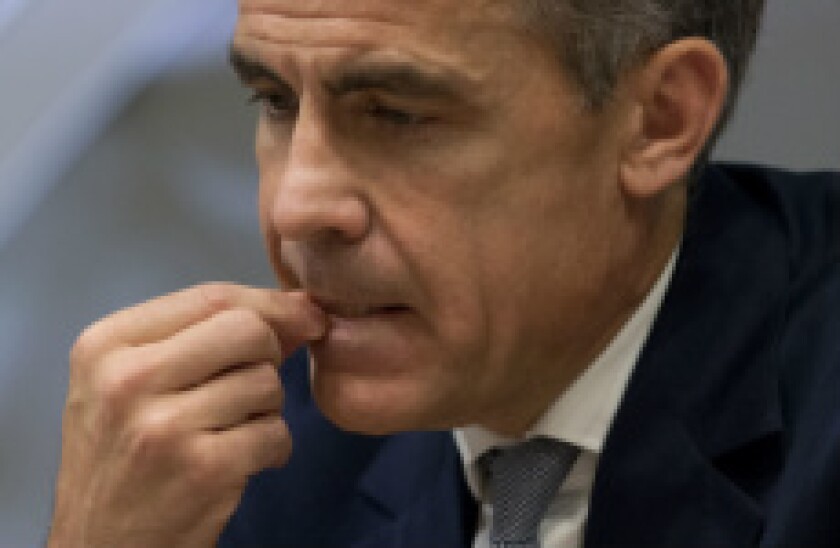The handsome Canadian has never been your correspondent's favourite central banker. Mark Carney arrived in Britain in a blaze of glory, fawned over by George Osborne's treasury, but came from a Canada locked into a worrisome housing boom, and with an unwarranted reverence for the talking shop he chaired, the Financial Stability Board. We'd have far rather seen home-grown talent like Paul Tucker or Andy Haldane take the top job.
But no matter. Since then, he's proven equal to an era of unprecedented central bank power, and (it seems to us) discharged his responsibilities with dignity and gravitas. Talking shops such as the 'One Bank' initiative, the Future Forum, the Open Forum on Fair and Effective Markets — have proliferated, but that's no bad thing. The Bank of England's traditional values have been upper class discretion but some managerial professionalism and transparency is only appropriate for modern times.
Recently, though, he's been hauled over the coals. UK prime minister Theresa May described the effects of his monetary policy as having “bad side effects” even though she was a leading member of the government that steadfastly refused any fiscal easing, and left the burden of recovery squarely on aggressive monetary policy.
That's nothing, though, compared to the criticisms from the hard Brexit crowd, who claim that he "politicised the office" by warning of financial chaos following the Brexit vote.
It's true that the UK GDP figures for the third quarter are strong, but with sterling at its lowest ever level, to say that markets are sanguine about Brexit requires heroic levels of self-delusion. And, of course, the Bank of England’s post-Brexit support actions — buying corporate bonds and committing cheap liquidity to banks — helped to stabilise markets, just as they were supposed to.
A good central banker, in this activist age, is not supposed simply to predict economic conditions, but also to take action to prevent the worst predictions from coming true. What would be the point of a Bank of England which sat on its hands while the financial chaos it predicted unfolded?
Carney also stands accused of failing to “talk up” the UK after the vote, preferring, instead, to continue to warn of the damaging effects of uncertainty. While that’s technically correct — no trade missions have been led, no content-free bullishness unleashed, you don’t have to look far for his job description. The Bank of England is supposed to achieve a 2% inflation rate, and financial stability. Absolutely nowhere is the Bank tasked with “talking up” Britain.
But for any quasi-religious group of ideologues, it’s not about the facts.
If you start from a belief that Brexit is always and everywhere a good thing, then suggesting it might be detrimental to financial stability makes you bad and unpatriotic. It’s delusional, but it has perfect internal consistency.
Certain right-leaning publications floated Conservative backbencher Jacob Rees-Mogg as Carney's replacement. His father was a major cheerleader for Milton Friedman and the monetarists while editor of The Times, and Rees-Mogg has been critical of Carney — but other than that, his main qualification for the role is as partner in boutique asset manager Somerset Capital Management.
Thankfully, by Monday evening, the turmoil was over — Carney announced he would stay on as governor until June 2019, covering the two year period between May’s planned formal notice to quit to the EU in March 2017, and Britain’s final departure date.
But the whole incident is unpleasantly reminiscent of the worst aspects of emerging markets investing.
Trying to force out respected technocrats for insufficient demonstrations of ideological purity is what tinpot dictators of fractured states do when their currencies are collapsing, when shooting the messenger becomes more appealing than dealing with the message.
When central bankers are politically ejected in more prominent economies — Hungary and India are recent examples — it rightly shocks markets, usually leading to exchange rates falling and borrowing costs rising.
It’s a symbol of disdain for finance, a rejection of the advice and funding available in international markets, and, usually, of a leader that wants to consolidate their personal power. In short, even though the calls for Carney’s head have been unsuccessful, it’s not a good look for one of the world’s largest economies and the host of its premier international financial centre.
None of this is to argue that the independence of central banks is somehow sacrosanct.
When the European Central Bank is printing more money in a month than some of its members’ produce in GDP in a year, and the only way to hold its president, Mario Draghi, to account is to sneak into his press conferences and dump glitter on him, there’s clearly a debate to be had on public oversight and democratic deficits.
Central bank independence is instrumental, pragmatic and moderate. It’s a way for countries to show markets that they value long term stability over short term advantage, not a religion. But still, the symbol has power, as emerging market finance ministers are very well aware, even if their developed market counterparts have forgotten it.
Even now Carney is safe, the question for the hardcore Brexit brigade has to be: what do they want their actions to symbolise? Do they want to signal to the world that Britain is open, stable and a grown-up part of international markets, as it has been for the last 200 years, or do they want to make it look like a banana republic?

